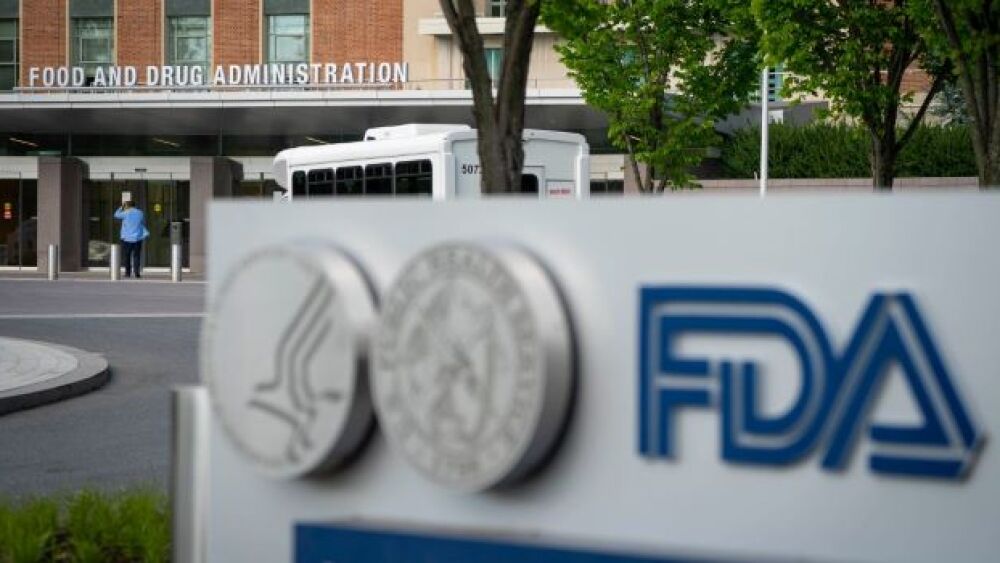The U.S. Food and Drug Administration is wrapping up 2021 with a fairly busy schedule for the month of December. Here’s a look at the first half of the month.
Sarah Silbiger/Getty Images
The U.S. Food and Drug Administration (FDA) is wrapping up 2021 with a fairly busy schedule for the month of December. Here’s a look at the first half of the month.
Daré’s Bacterial Vaginosis Treatment
DARÉ Bioscience, based in San Diego, has a target action date of December 7, 2021, for its New Drug Application (NDA) for DARE-BV1 for treatment of bacterial vaginosis. The drug is being evaluated under a Priority Review pathway. The drug is a unique hydrogel formulation of clindamycin phosphate 2%.
The NDA was supported by positive data from the DARE-BVFREE Phase III trial. The trial demonstrated the drug’s potential to improve clinical cure rates in a convenient, one-time dose compared to current FDA-approved products for the same condition.
At the company’s third-quarter financial report on November 10, Sabrina Martucci Johnson, president and chief executive officer of Daré said, “On the heels of the important milestones achieved thus far in 2021, we are gearing up for an eventful next few months, and I look forward to providing updates as we progress further.”
Adcom for Reata’s Bardoxolone Methyl Capsules for Chronic Kidney Disease
The FDA’s Cardiovascular and Renal Drugs Advisory Committee is meeting on December 8 to discuss the NDA by Reata Pharmaceuticals for bardoxolone methyl capsules to treat chronic kidney disease caused by Alport syndrome in patients 12 years of age and older. Alport syndrome is a rare, genetic form of chronic kidney disease caused by mutations in the genes for type IV collagen. In these patients, the kidneys progressively lose the ability to filter waste products from the blood. About 50% progress to kidney dialysis by age 25 and 90% by age 40, with about 100% by age 60.
The application is based on data from the Phase III CARDINAL trial. The primary endpoint for Year 2 was change from baseline in eGFR after 100 weeks of treatment. The patients receiving the drug had a statistically significant improvement in kidney function as measured by eGFR compared to the placebo cohort.
The PDUFA date for the NDA is February 25, 2022.
Merck’s Keytruda in Renal Cell Carcinoma Post-Surgery
Merck’s blockbuster checkpoint inhibitor Keytruda (pembrolizumab) had a target action date of December 10 for its supplemental Biologics License Application (sBLA) for adjuvant treatment of patients with renal cell carcinoma (RCC) at intermediate-high or high risk of recurrence after nephrectomy, or following nephrectomy and resection of metastatic lesions. The FDA approved Keytruda for this indication on November 18.
The sBLA was built on data from the Phase III KEYNOTE-564 trial, where Keytruda demonstrated statistically significant and clinically meaningful improvement in disease-free survival (DFS) compared to placebo.
“Despite decades of research, limited adjuvant treatment options have been available for earlier-stage renal cell carcinoma patients who are often at risk for recurrence,” said Toni K. Choueiri, director, Lank Center for Genitourinary Oncology, Dana-Farber Cancer Institute, and professor of medicine, Harvard Medical School. “In KEYNOTE-564, pembrolizumab reduced the risk of disease recurrence or death by 32%, providing a promising new treatment option for certain patients at intermediate-high or high risk of recurrence.”
Amgen’s Otezla for Mild-to-Moderate Plaque Psoriasis
Amgen has a target action date of December 19 for its supplemental NDA (sNDA) for Otezla (apremilast) for adults with mild-to-moderate plaque psoriasis who are candidates for phototherapy or systemic therapy. The sNDA was submitted on February 19, 2021, and was built from data from the Phase III ADVANCE trial. In the trial, the oral 30 mg twice-daily dose achieved a statistically significant improvement in the static Physician’s Global Assessment (sPGA) response at Week 16 compared to placebo, including hitting at least a 75% improvement from baseline in the proportion of affected body surface area (BSA), change in BSA total score from baseline and change in Psoriasis Area and Severity Index (PASI) total score from baseline at Week 16.





